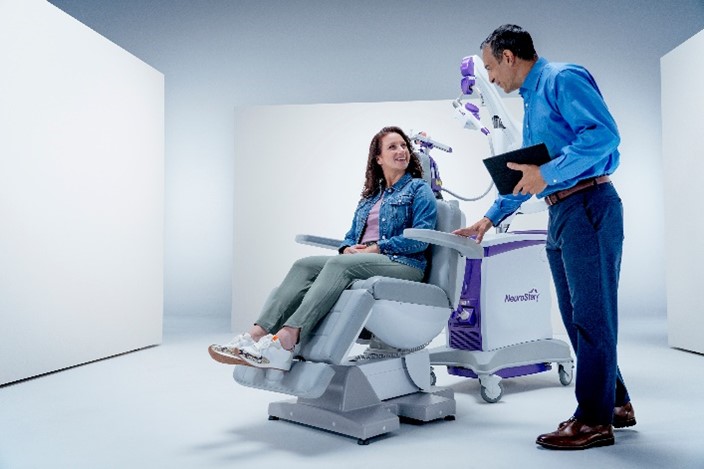
Transcranial magnetic stimulation (TMS)
If you have depression and other forms of treatment, like medicine and therapy aren’t working, transcranial magnetic stimulation (TMS) may be an option for you.
Learn more
This is the NeuroStar Transcranial Magnetic Stimulation device that we use to deliver TMS in our suite at Abbott Northwestern.
Before treatment begins, we position the patient in the chair. The chair and headrests are adjustable to ensure proper alignment and comfort.
For the first visit, we conduct a TMS motor threshold determination to ensure our treatments are accurately targeting the left dorsolateral prefrontal cortex.
The TMS physician and operator methodically move the coil and chart the results until we find the best treatment target.
We adjust the energy of the magnet until we see movement of the patient's hand. Ideally, we search for a location where only the thumb moves after a pulse is given.
After we have identified the target location, we give varying amounts of energy to determine the optimal energy to deliver during a treatment session.
During this portion, we use a program that calculates different energy levels to test. After about 30 pulses, we are able to determine what the treatment SMT Level should be for the patient.
Once we have the location and energy level determined, we move the treatment coil a set amount forward from the MT location and calculate the settings for a full treatment session.
The patient receives their first treatment that day. We use the same settings for each subsequent treatment.
Transcranial magnetic stimulation at Allina Health
Transcranial magnetic stimulation (TMS) is a non-medication treatment for people 18+ who are experiencing severe depression and have not found relief from other treatments. TMS involves stimulating underactive areas of the brain with brief magnetic pulses to help regulate brain mood.
Clinical studies show one in two patients who have had TMS had significant improvement in depression symptoms and one in three were symptom free.
We currently offer transcranial magnetic stimulation at two locations:
- Mental Health Abbott Northwestern Clinic at Abbott Northwestern Hospital
- Mental Health & Addiction Specialty Center at Mercy Hospital – Unity Campus
TMS is an outpatient in-person service that lasts between 5 to 45 minutes per session. A treatment course is five days a week (Monday-Friday) for six weeks, followed by a taper over three weeks.
Changing patients' lives
We were one of the first health systems in the state of Minnesota to implement Neurostar TMS. According to Neurostar, we have treated the most patients in Minnesota with this technology since starting our TMS program. In the past five years, we have completed over 14,000 TMS treatments bringing significant relief to patients with treatment-resistant depression.

What to expect from your first transcranial magnetic stimulation treatment
Prior to your first treatment, you will complete a consultation with one of our team members to confirm TMS is the right option for you and that your treatments are done in an effective, comfortable, safe and timely manner.
During your TMS treatment, the device will stimulate underactive areas of your brain with brief magnetic pulses. You will:
- sit comfortably in the treatment chair and remain alert
- have a small, curved device containing a magnetic coil placed on your scalp near your forehead by one of our TMS operators
- be given earplugs to wear
- receive brief magnetic stimulation through the device on your scalp
- hear "clicking" sounds
- feel a "tapping" sensation on your forehead
After your TMS treatment, you might:
- feel discomfort at or near the treatment area. This is often short-lived and typically goes away after the first week of treatment
- have side effects, such as a mild headache, but it should be limited to the treatment day. Side effects from TMS are minimal compared to other mental health treatments
You can drive to and from each treatment session and resume your typical activities.
More information on transcranial magnetic stimulation
We are currently unable to treat patients with bipolar disorder, psychosis or a history of mania or hypomania.
Most insurance companies, including Medicare, Medicaid and private insurers will cover TMS treatment. For questions, check with your insurance provider.
Related links
Source: Allina Health Mental Health
Reviewed by: Allina Health Mental Health
First published: 9/25/2019
Last reviewed: 9/25/2019